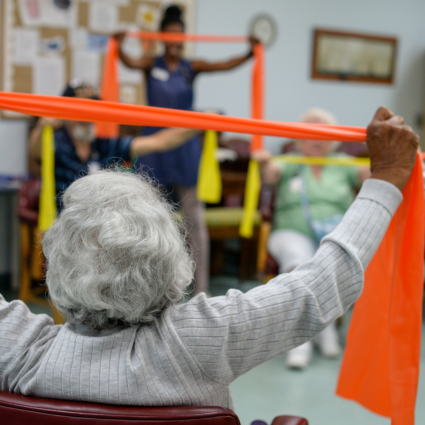June is Alzheimer’s & Brain Awareness Month – a time to learn, reflect, and support those impacted by the disease. Read about practical strategies for navigating challenges, staying connected, and caring for your own well-being.
caregiver
This May, in honor of Older Americans Month, we celebrate the lives and legacies of our older loved ones. From sharing stories and preserving memories to making new ones together, this post offers simple, heartfelt ways caregivers can deepen connection and show appreciation.
Being a caregiver can feel overwhelming – but you don’t have to do it alone. This month, learn how to create a simple, personalized caregiver’s toolkit to help you stay organized, reduce stress, and support both you and your loved one every step of the way.
Spring is the perfect time to revitalize the mind and spirit. For older adults with dementia, small, engaging activities – like storytelling, gardening, or listening to music – can stimulate memory and enhance well-being. Discover simple ways to bring joy, creativity, and connection into daily caregiving.
Celebrate the love that caregiving brings this Valentine’s season with simple, heartfelt ways to connect, share joy, and nurture bonds with your loved one.
Set realistic caregiving goals this New Year to improve both your well-being and your loved one’s quality of life. From prioritizing self-care to strengthening your support network, discover small, actionable steps to make this year more fulfilling and less overwhelming.
Marylanders know that summertime means goin’ down the ocean for some fun in the sun. For families caring for someone living with dementia, beach vacations can still be joyful and memorable experiences with a bit of planning and preparation.
Living with Alzheimer’s or other forms of dementia presents unique challenges, not only for the individuals directly affected but also for their caregivers and loved ones. Among these challenges, perhaps one of the most crucial is communication.
Engaging in physical activities isn’t just good for your body – it’s great for your mental health too! Research shows that even short burst of exercise can lift your mood and reduce stress.
According to the National Council on Aging, regular activity, not just exercise can positively impact our mental, emotional and physical wellbeing. The important thing is finding something that is comfortable and sustainable for you.











